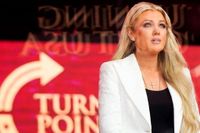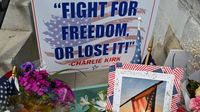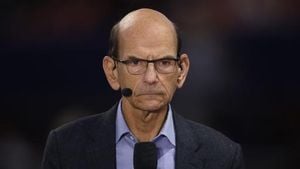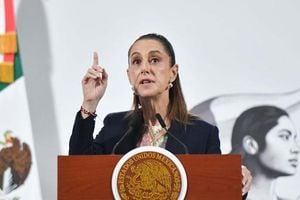On a September afternoon in 2025, the campus of Utah Valley University was the unlikely stage for a tragedy that would reverberate throughout American politics and social media. Charlie Kirk, the high-profile conservative activist and founder of Turning Point USA, was shot and killed while addressing a packed auditorium. The aftermath has been a whirlwind of grief, controversy, and a renewed spotlight on how information, sentiment, and violence intersect in the digital age.
According to The New York Post, Kirk had written a letter to Israeli Prime Minister Benjamin Netanyahu just months before his death, warning that Israel was "losing the information war" on platforms like TikTok. In the May 2025 letter, Kirk cautioned that, "Anti-Israel sentiment can undermine American support for Israel." He continued, "My team and I have spent months analysing these trends and debating ideas that could help you and your country push back against these disturbing developments." Kirk’s concern was clear: as Gen Z scrolled past pro-Israel hashtags, support for the Jewish state was eroding, and this could have real consequences for U.S.-Israel relations.
Kirk’s letter, reproduced in full by The New York Post for the first time, laid out seven concrete suggestions for Netanyahu’s government. Among them: establishing a rapid response team on social media similar to President Trump’s White House staff, cultivating pro-Israel experts to fact-check misinformation about the Gaza conflict in real time, and creating an "Israel Truth Network" to serve as a repository of reliable information. He also proposed sending hostages released from Gaza on a U.S. speaking tour, arguing that such firsthand accounts would be "very effective messaging." Kirk wrote, "When you don’t push back, anti-Semitism and anti-Israel propaganda fill the void." He even critiqued Israel’s communication style, saying, "I’ve seen your IDF spokesman defend Israel standing at a dimly lit podium. This looks like a scene out of the 1970’s – like some old Walter Cronkite clips of the TV news. You need to tear down your old ways of communicating and start over from scratch."
Netanyahu referenced Kirk’s letter in a video address on September 18, just eight days after Kirk’s death. The Prime Minister called out "monstrous" falsehoods circulating online, including baseless claims that Israel was somehow involved in the activist’s killing. Some right-wing commentators, like Candace Owens, suggested Kirk was coerced into publicly defending Israel, but these assertions were disputed by figures like Pershing Square Capital Management’s Bill Ackman, who published private messages refuting such claims.
As for the tragic event itself, the details are as chilling as they are clear. On September 10, 2025, Kirk was shot in front of thousands of students at Utah Valley University. According to court documents cited by CNN, Tyler Robinson, a 22-year-old former Utah State University student and electrical apprentice, was identified as the alleged shooter. The day after the attack, Robinson was apprehended after turning himself in peacefully at the Washington County Sheriff’s Office. Prosecutors have charged him with aggravated murder, two counts of obstruction of justice, felony discharge of a firearm causing serious bodily injury, two counts of witness tampering, and commission of a violent offense in the presence of a child. If convicted, Robinson faces the death penalty.
The evidence, as outlined in charging documents and reported by CNN, is substantial. Robinson allegedly confessed to the shooting multiple times—first in text messages to his partner, then in conversations with friends on Discord, and later to his family and a retired sheriff’s deputy. In a message sent on the day of the attack, Robinson told his partner to "drop what you are doing, look under my keyboard." There, his partner found a note reading, "I had the opportunity to take out Charlie Kirk and I’m going to take it." He later messaged, "had enough of his hatred," and explained that he had planned the attack for more than a week. Robinson even referenced the engraved bullets he used, describing them as "mostly a big meme."
On Discord, a platform favored by gamers and online communities, Robinson reportedly told a small group chat, "bad news ... it was me at UVU yesterday." He thanked the group for "all the good times and laughs" and indicated he would surrender soon. Robinson’s partner provided investigators with these messages, which included details about the rifle left at the scene and the engraved bullets. Utah Governor Spencer Cox confirmed that Discord’s investigation found no evidence Robinson had promoted violence or planned the attack on the platform.
Surveillance footage and forensic analysis further tied Robinson to the crime. According to CNN, Robinson arrived at the university hours before the shooting, wearing a maroon T-shirt, light shorts, and a black hat. After the shooting, he changed into a different outfit, as captured by university surveillance cameras. The murder weapon—a Mauser Model 98 .30-06 caliber bolt-action rifle with a mounted scope—was found wrapped in a towel in a wooded area near campus. Robinson had discussed the rifle in messages to his partner, expressing concern about returning "grandpa’s rifle" and whether it had a serial number. Forensic tests revealed DNA consistent with Robinson’s on the rifle, the towel, the fired cartridge casing, and two of the three unfired cartridges.
Robinson’s defense attorneys made their first court appearance on September 16, 2025, where Robinson appeared virtually from jail. He did not enter a plea, and the next hearing is scheduled for October 30. Prosecutor Chad Grunander described the case as "voluminous," noting that the murder was witnessed by thousands and captured on video, making the process of identifying witnesses particularly complex.
The killing has inflamed America’s already polarized political climate. President Trump, who credited Kirk with galvanizing the youth vote, called him a "martyr for truth and freedom" and blamed the "radical left" for political violence. The reaction has been swift and, at times, severe—some individuals have reportedly lost their jobs over comments made in the wake of Kirk’s death. Thousands attended an emotional memorial for Kirk in Arizona, with prominent conservative leaders paying tribute to his legacy.
Kirk’s final months were marked by his passionate advocacy for Israel and his warnings about the dangers of losing the "information war." In his letter, he wrote, "The Holy Land is so important to my life, and it pains me to see support for Israel slip away." His words now echo in a nation grappling with the consequences of both digital and real-world battles for hearts, minds, and, tragically, lives.
As the legal process unfolds and the political debate rages on, Kirk’s warnings about the power of narrative—and the costs of losing control over it—ring with a new and somber urgency.






